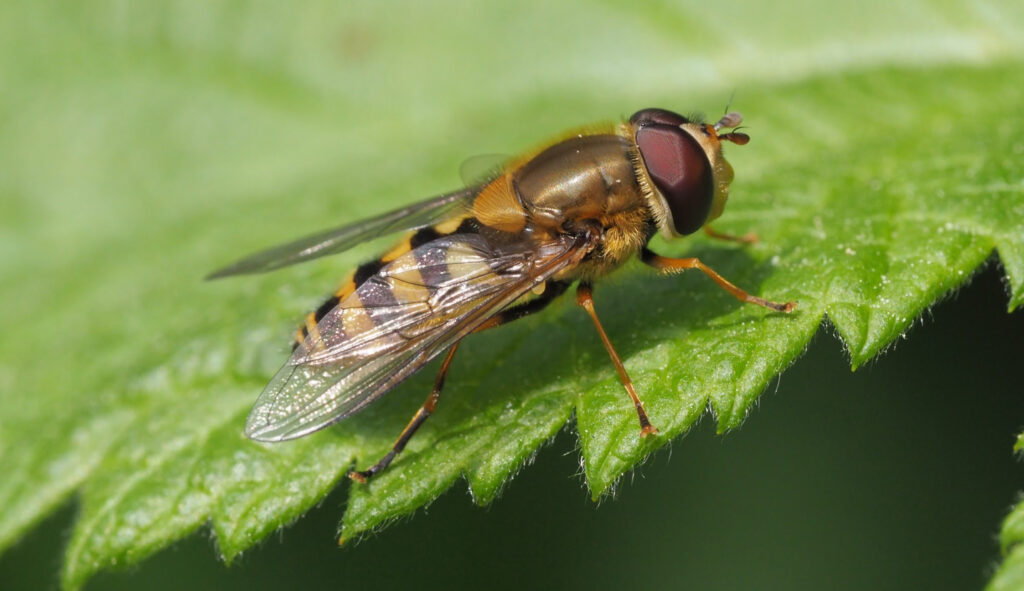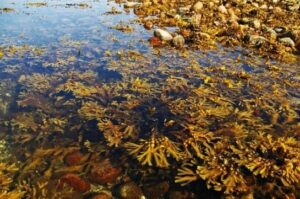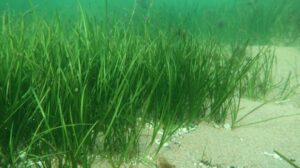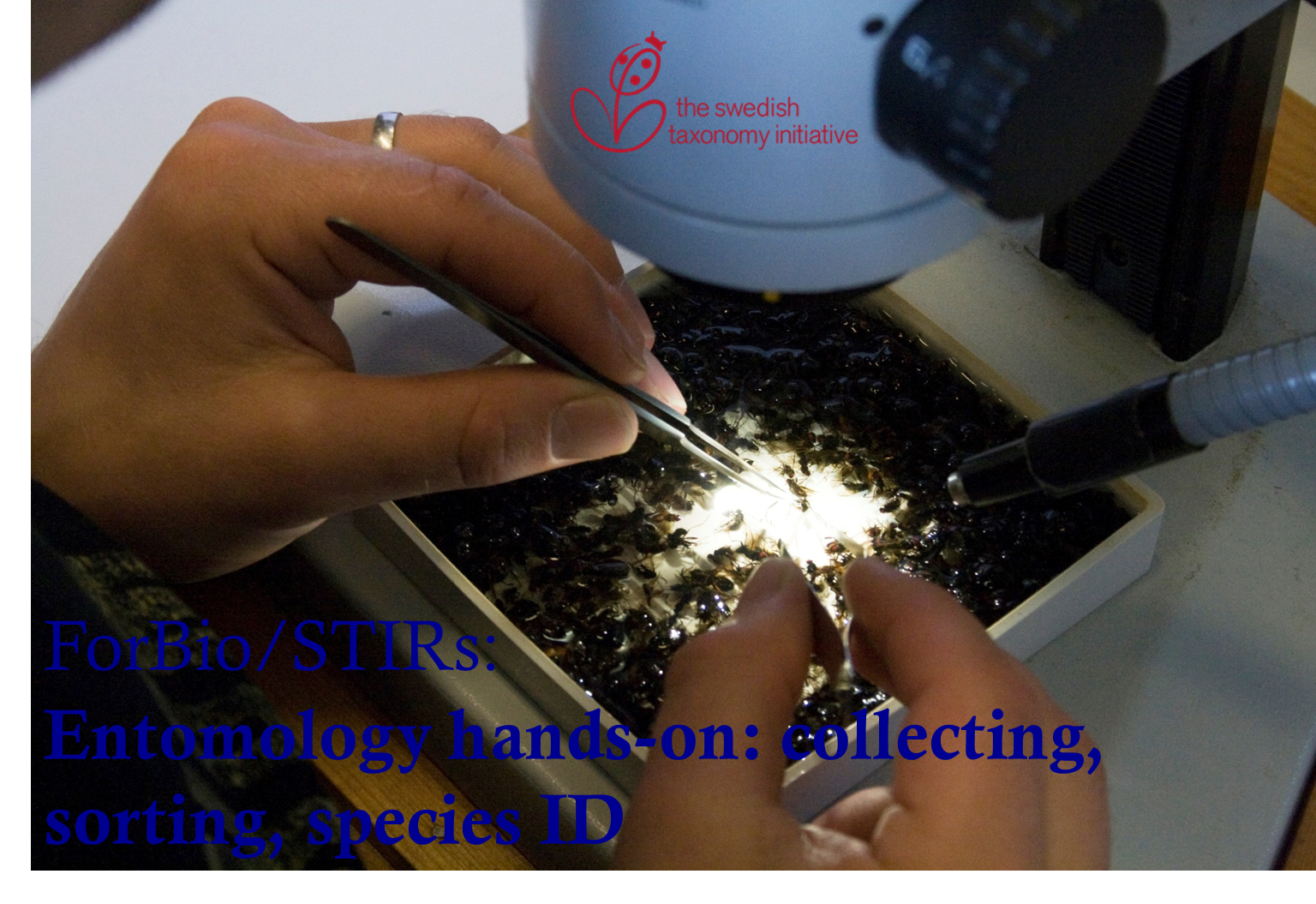Än finns det tid att söka bidrag för nätverkande aktiviteter! Sista ansökningsdag är 23 april. SLU Artdatabanken utlyser bidrag från Svenska artprojektet för nätverkande aktiviteter som stimulerar uppbyggnad av kompetens inom systematik och taxonomi. https://www.slu.se/artdatabanken/om-oss/svenska-artprojektet/svenska-artprojektet-ger-bidrag/bidrag-for-natverkande-aktiviteter/
Författararkiv: Maria Backlund
Swedish Taxonomy Initiative and ForBio course: Nomenclature codes in biology
What to consider when naming and describing taxa
An in-person course directly following the Swedish Conference “Systematikdagarna” in late November 2024
A three day course (Wed, 20 Nov – Fri, 22 Nov) at Göteborg Natural History Museum, following Systematikdagarna (Mon, 18 Nov – Tue, 19 Nov) at Göteborg University, Sweden
Time and place: Nov. 20, 2024 9:00 AM – Nov. 22, 2024 4:30 PM, Göteborg University, Sweden

Course scope:
The course will present an overview of the different nomenclature codes with special focus on the botanical-mycological-phycological (ICNafp), zoological (ICZN) and prokaryotes (ICNP) codes. Sessions will include lectures and exercises, and the participants will learn what is required for a name and a description as well as for the scientific work itself to be code-compliant.
Learning outcomes. Participants will acquire an understanding of:
– which are the existing nomenclature codes.
– the difference between nomenclature and taxonomy.
– what is a ”scientific name” and what is meant by authorship.
– what is a ”scientific work”.
– rules of nomenclature with special focus on proposing new scientific names.
– the differences between botanical and zoological nomenclature.
– implications of names and their practical use in biology/management/conservation including examples of issues with misidentifications, misspellings, changed combinations, synonymy, ethics, etc.
Target group: MSc students, PhD students, postdocs, researchers, consultants, government officials, museum staff with relevant background in biology.
Course language: English.
Course schedule: Not yet available.
Course fee: Free.
Registration: Please register here before 15th September
Teachers: Thomas Pape (Natural History Museum of Denmark, Copenhagen), Micah Dunthorn (Natural History Museum, Oslo), Torbjörn Tyler (Lund University, Botanical collections).
Assignment and credits: The course is equivalent to 2 ECTS. Active participation is required for full credit. ForBio will provide certificates for those who attend the in-person section and successfully complete the course assignments.
STI contact: Maria Backlund, Malin Strand
ForBio contact: Quentin Mauvisseau
Sök bidrag för nätverkande aktiviteter
SLU Artdatabanken utlyser bidrag från Svenska artprojektet för nätverkande aktiviteter som stimulerar uppbyggnad av kompetens inom systematik och taxonomi. Bidraget kan användas till nätverksbildande och kompetenshöjande aktiviteter med fokus på ökad kunskap om arter inom mindre kända organismgrupper i Sverige. Bidraget riktar sig särskilt till aktiviteter som gynnar samarbete och kunskapsutbyte mellan junior och senior kompetens. Sista ansökningsdag: 22 april. https://www.artdatabanken.se/det-har-gor-vi/svenska-artprojektet/svenska-artprojektet-ger-bidrag/bidrag-for-natverkande-aktiviteter/
Swedish Taxonomy Initiative and ForBio course: Nomenclature codes in biology
What to consider when naming and describing taxa
An in-person course directly following the Swedish Conference “Systematikdagarna” in late November 2023
A full three day course (Wed, 29 Nov – Fri, 1 Dec) following Systematikdagarna (Mon, 27 Nov – Tue, 28 Nov) at Lund University, Sweden
Time and place: Nov. 29, 2023 9:00 AM–Dec. 1, 2023 4:30 PM, Lund University, Sweden

Course scope:
The course will present an overview of the different nomenclature codes with special focus on the botanical-mycological-phycological (ICNafp), zoological (ICZN) and prokaryotes (ICNP) codes. Sessions will include lectures and exercises, and the participants will learn what is required for a name and a description as well as for the scientific work itself to be code-compliant.
Learning outcomes. Participants will acquire an understanding of:
– which are the existing nomenclature codes.
– the difference between nomenclature and taxonomy.
– what is a ”scientific name” and what is meant by authorship.
– what is a ”scientific work”.
– rules of nomenclature with special focus on proposing new scientific names.
– the differences between botanical and zoological nomenclature.
– implications of names and their practical use in biology/management/conservation including examples of issues with misidentifications, misspellings, changed combinations, synonymy, ethics, etc.
Target group: MSc students, PhD students, postdocs, researchers, consultants, government officials, museum staff with relevant background in biology.
Course language: English.
Course schedule: Not yet available.
Course fee: Free.
Registration: Please register here. Registration deadline is 15th September.
Teachers: Thomas Pape (Natural History Museum of Denmark, Copenhagen), Allison Perrigo (Lund University Botanical Garden), Micah Dunthorn (Natural History Museum, Oslo), Ana Tronholm (University of Gothenburg), more to be announced.
Assignment and credits: The course is equivalent to 2 ECTS (three day in-person course and additional individual written assignments). ForBio will provide certificates for those who attend the in-person section and successfully complete the course assignments.
Nu kan du söka bidrag för nätverkande aktiviteter

SLU Artdatabanken vill stärka samverkan och kunskapsöverföring inom taxonomi och systematik. Nu kan du som vill anordna en nätverkande aktivitet söka bidrag från Svenska artprojektet. Sista ansökningsdatum är 21 april. För mer information och ansökan: https://www.artdatabanken.se/artdata-nyheter-kopior/2023/2/nu-kan-du-soka-bidrag-for-natverkande-aktiviteter/
ForBio, STI, and Tjóðsavnið course: Biosystematics, ecology and applied science of flies and midges (Insecta: Diptera)
ForBio and the Swedish Taxonomy Initiative invite applicants to “Biosystematics, ecology and applied science of flies and midges (Insecta: Diptera)”. The course is hosted by Agnes-Katharina Kreiling and Leivur Janus Hansen from the Faroe Islands National Museum, Tjóðsavnið and will be held at Sandur (Sandoy), Faroe Islands.
Time and place: June 23, 2023–June 30, 2023, Sandur (Sandoy), Faroe Islands
Application deadline: March 13, 2023

ForBio and STI course: DNA barcoding – from sequences to species 2023
ForBio and the Swedish Taxonomy Initiative invites applicants to the course DNA-barcoding – from sequences to species. The course will be held at NTNU in Trondheim, Norway.
Time and place: May 8, 2023–May 12, 2023, NTNU, Trondheim
ForBio and STI course: DNA barcoding – from sequences to species 2023 – ForBio (uio.no)
Application deadline: March 10th, 2023

Baltic macrophytes – systematics, sampling, species identification. STI and ForBio course
Time and place: 2021 September 12-18, Askö laboratory – Stockholm University Baltic Sea Centre, Sweden


Course aims: The course will present and provide an overview of the macrophytes in the Baltic sea. We will cover the systematics, taxonomy and identification of different macrophyte groups, such as macroalgae, phanerogams and also couple of bryophytes. Sessions will include lectures, fieldwork and laboratory exercises. The students will learn various techniques for identification and sampling.
The target group is PhD students, master students, researchers, consultants, government officials/museum staff – with relevant background in biology.
Learning targets:
- General understanding of systematics and taxonomy of macrophytes
- Techniques for collecting macrophytes
- Techniques for species identification
Maximum number of participants: 20, in case of more applicants, participants will be selected based on the scientific, educational and/or professional merit of the course, with priority given ForBio members and students/researchers enrolled in the Swedish Taxonomy Initiative (STI).
Target group: PhD students, master students, postdocs, researchers, consultants, government officials, museum staff with relevant background in biology.
Working language: English/Scandinavian
Assignment and credits: The course is equivalent to 2 ECTS.
Registration: Registration is open! Deadline August 1st.
For registration and more information: https://www.forbio.uio.no/events/courses/2021/Macrophytes.html
Contact: STI representative Maria Backlund (maria.backlund@slu.se) or ForBio coordinator Quentin Mauvisseau (quentin.mauvisseau@nhm.uio.no)
Ledig tjänst: Disputerad biolog inom systematik/taxonomi
Ref SLU ua 2021.2.5.1-557
SLU Artdatabanken är ett kunskapscentrum för Sveriges arter och naturtyper. Vi bidrar till en hållbar förvaltning av naturresurser genom att samla in, analysera och tillgängliggöra data samt beskriva och presentera fakta om biologisk mångfald. Vi samverkar nationellt och internationellt med naturvårdsnyttan i fokus. Vi söker nu en biolog för arbete med vår taxonomiska databas, som utgör navet i SLU Artdatabankens verksamhet. Du kommer att arbeta i en stimulerande miljö där du ingår i en grupp av kollegor som tillsammans utgör en mycket viktig pusselbit inom svensk naturvård.
Arbetsuppgifter:
Du kommer att arbeta med utredning av namn, släktskap och taxa för inläggning i SLU Artdatabankens databaser, och delta i utveckling av verksamheten. I arbetet ingår kommunikation och samverkan med interna och externa användare, samt deltagande i nordiska och andra internationella samarbeten. Du kommer också att delta i arbetet med utlysning av bidrag från Svenska artprojektet och omhändertagande av resultat från beviljade projekt. Det kan också bli aktuellt att jobba med projektledning, framtagande av artrelaterat innehåll till stöd för artbestämning och samordning av de taxonomiska behoven vid utveckling av IT-baserade funktioner och tjänster.
Kvalifikationer:
Du ska ha disputerat inom ämnet systematik/taxonomi och ha en grundläggande utbildning inom biologi eller motsvarande. Du ska vara noggrann och ha mycket god förmåga att formulera och uttrycka dig på både svenska och engelska. Du ska ha förmåga att skapa och upprätthålla nätverk samt arbeta målinriktat och flexibelt såväl individuellt som i grupp. Vi lägger stor vikt vid personliga egenskaper.
Det är meriterande om du har bred kunskap om olika organismgrupper och erfarenhet av arbete med nomenklatoriska regelverk. Du har helst erfarenhet av systematiskt arbete med både molekylära och morfologiska metoder, bestämningsnycklar och artbeskrivningar. Vi ser gärna att du har erfarenhet av arbete med databaser och databasinläggning samt utveckling av IT-baserade funktioner och tjänster. Det är också meriterande om du har erfarenhet av projektledning/arbetsledning, korrekturläsning, av att skriva och läsa forskningsansökningar.
Placering:
Uppsala
Anställningsform:
Tidsbegränsad anställning 2 år med viss möjlighet till förlängning.
Omfattning:
100%
Tillträde:
Enligt överenskommelse.
Ansökan:
Välkommen med din ansökan via ansökningsknappen nedan senast den 2021-03-07.
Fackliga kontaktpersoner:
https://internt.slu.se/min-anstallning/facket/kontaktpersoner/
Sveriges lantbruksuniversitet (SLU) utvecklar kunskapen om de biologiska naturresurserna, och hur vi kan förvalta och nyttja dem på ett hållbart sätt. Detta sker genom utbildning, forskning och miljöanalys, i nära samverkan med näring och samhälle. SLU är ett internationellt och forskningsintensivt universitet, men erbjuder också unika utbildningar som agronom, veterinär, jägmästare, miljöekonom och landskapsarkitekt.
SLU har drygt 3000 medarbetare, 5000 studenter och forskarstuderande och en omsättning på över tre miljarder kronor. Universitetet satsar på attraktiva miljöer på sina campusområden i Alnarp, Umeå och Uppsala.
www.slu.se
SLU eftersträvar mångfald och jämn könsfördelning.
Kontaktpersoner
Liselott Sjödin Skarp
Chef program Artinformation
018-67 34 58
fornamn.efternamn@slu.se
Maria Backlund
Taxonom
018-67 23 41
fornamn.efternamn@slu.se
Johan Liljeblad
Taxonom
018-67 14 34
fornamn.efternamn@slu.se
Länk till den här sidanhttps://www.slu.se/om-slu/jobba-pa-slu/lediga-tjanster/?rmpage=job&rmjob=4562&rmlang=SE
ForBio and STI course: Entomology hands-on: collecting, sorting, species ID
The course presents several aspects of insect handling in field and in collections. You will get hands-on experience in collecting, handling, sorting, identifying and preserving of insects. We will broadly cover different taxonomic levels/groups, and provide some opportunities to dive deeper into some of them.
Time and place: Sep. 2, 2018 9:00 AM – Sep. 9, 2018 5:00 PM, Station Linné, Öland

Learning targets:
- Understand several methods for collecting
- Knowledge of taxonomic sorting methods and tools
- Knowledge of identification procedures for most larger insect groups
- Basic understanding of advanced techniques for species ID in lab
The core teachers responsible for different parts of the course are the entomologists working at the station: Dave Karlsson, Jon Tinnert and Mathias Jaschhof. Visiting lecturers will also be invited to cover a wider taxonomic spectrum of insect groups: Marianne Espeland (tentative) and Björn Rulik, both are from Zoologisches Forschungsmuseum Alexander Koenig, Bonn. Participants are expected to read literature prior to the course, and take active part in all sessions. Station Linné is coordinating the largest Malaise trap project ever run in Scandinavia: “SMTP”, Swedish Malaise Trap Project, and preserved SMTP-material will be one of the parts of the course content.
Target group: PhD students, master students, researchers, consultants, government officials/museum staff – with relevant background in biology.
Working language: English/Scandinavian
Recommended course credits: 3 ECTS
Number of participants: Maximum 18.
Course Fee, Accommodation and food costs: There is no course fee. ForBio members that are PhD/MSc-students or PostDocs in Norway can have travel, accommodation and food costs covered. ForBio assoiciates will have to pay for accommodation and food. Applicants affiliated to Swedish Universities/Research Institutes will get their accommodation and food (not travel) covered by STI. All other categories of participants will have to use own funds for travel as well as to cover accommodation and catering at the station. The costs of accommodation at the Station Linné and food (combination of catering and self-service) is 2800 SEK for the whole duration of the course, 8 days.
Registration: Register with a short CV indicating the nature and stage of your interest or research project. The registration form is provided here. Registration deadline is June 10, 2018. Priority will be given to students/researchers enrolled in the Swedish Taxonomy Initiative and to members of ForBio, should the maximum number of participants be exceeded.
Questions:
- for the course content queries: Maria Backlund, STI, e-mail: maria.backlund@slu.se
- for registration queries: Galina Gusarova, ForBio, e-mail: galina.gusarova@uit.no

